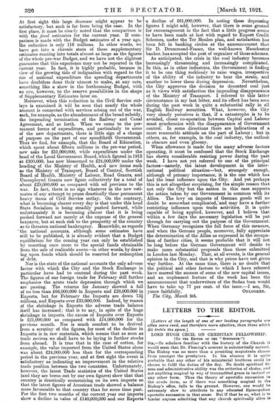LETTERS TO THE EDITOR.
[Letters of the length of one of our leading paragraphs are often more read, and therefore more effective, than those which fill treble the space.] LORD HUGH CECIL ON CHRISTIAN FELLOWSHIP. (To TEL EDITOR or TER " SPECTATOR."]
scholars familiar with the history of the Church it would seem that Dr. Fleming's account is substantially correct. The Bishop was no more than a presiding magistrate chosen from amongst the presbyters. In his absence it is quite probable that any other of his ministerial brethren could be chosen to fulfil the duties of the day. No doubt spiritual fit- ness and administrative ability was the criterion of choice, and not anything magical by way of transmitted grace in tactual or any other form. Thus the theory of apostolic succession in the crude form, as if there was something magical in the Bishop's office, falls to the ground. However, one would be extremely slow to attribute to any educated Episcopalian apostolic succession in that sense. But if that be so, what is to hinder anyone admitting that any church spiritually alive is
in the true succession? Both Lord Hugh and Dr. Fleming rightly contend that the structure of the Christian ministry in their respective Churches had been arrived at under the guidance of the Divine Spirit. So has the ministry of the Salvation Army or any other body of Christians who may not expressly belong to any of the better recognized denominations. They equally claim to be in the true Apostolic succession in their campaign against the vice and evil of the world.
It seems to me, Sir, that Episcopalianism, Presbyterianism, Congr.gationalism, Wesleyanism, and all the other " ists " and "isms" are at beet only forms of Church government. And although they may all go back to apostolic times, and find sanction for their respective forms in the New Testament, yet the True Church is not to be identified with its organization. Even (to take an illustration as between Episcopalianism and Presbyterianism) if the latter, working on the germs given in Paul's writings, could make out a better case historically than the former, that would be no argument why the Church universal should become Presbyterian. It must be recognized that Paul, great religious genius as he was, has that in him which is vital and that which is not vital. His religion and spiritual vision are transcripts of the Master; not so his germs of Church government. Christ gave no express guidance in this direction. His religion is that of absolute freedom. And it may be that before the several denominations of Christendom can become unified some great prophet must arise to devise a form of Church government, perhaps different from any at present in existence, as the fitting vehicle of its combined cor- porate religious life.—I am, Sir, &c., JOHN A. SUTHERLAND.
A rdclach U.F.C. Manse, Nairn, N.B.



































 Previous page
Previous page